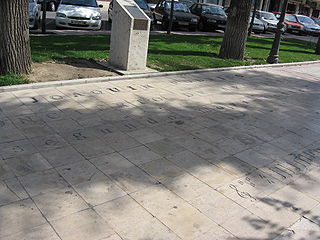
Martin Luther King Jr. was an American Baptist minister and activist, one of the most prominent leaders in the civil rights movement from 1955 until his assassination in 1968. An African-American church leader and a son of early civil rights activist and minister Martin Luther King Sr., King advanced civil rights for people of color in the United States through nonviolence and civil disobedience. Inspired by his Christian beliefs and the nonviolent activism of Mahatma Gandhi, he led targeted, nonviolent resistance against Jim Crow laws and other forms of discrimination.
White supremacy is the belief that white people are superior to those of other races and thus should dominate them. The belief favors the maintenance and defense of any power and privilege held by white people. White supremacy has roots in the now-discredited doctrine of scientific racism and was a key justification for European colonialism.

The 1960s was a decade that began January 1, 1960 and ended December 31, 1969.
Desegregation is the process of ending the separation of two groups, usually referring to races. Desegregation is typically measured by the index of dissimilarity, allowing researchers to determine whether desegregation efforts are having impact on the settlement patterns of various groups. This is most commonly used in reference to the United States. Desegregation was long a focus of the American civil rights movement, both before and after the United States Supreme Court's decision in Brown v. Board of Education, particularly desegregation of the school systems and the military. Racial integration of society was a closely related goal.

A counterculture is a culture whose values and norms of behavior differ substantially from those of mainstream society, sometimes diametrically opposed to mainstream cultural mores. A countercultural movement expresses the ethos and aspirations of a specific population during a well-defined era. When oppositional forces reach critical mass, countercultures can trigger dramatic cultural changes. Prominent examples of countercultures in the Western world include the Levellers (1645–1650), Bohemianism (1850–1910), the more fragmentary counterculture of the Beat Generation (1944–1964), and the globalized counterculture of the 1960s (1964–1974).

David Halberstam was an American writer, journalist, and historian, known for his work on the Vietnam War, politics, history, the Civil Rights Movement, business, media, American culture, Korean War, and later, sports journalism. He won a Pulitzer Prize for International Reporting in 1964. Halberstam was killed in a car crash in 2007, while doing research for a book.

The history of the United States from 1964 through 1980 includes the climax and end of the Civil Rights Movement; the escalation and ending of the Vietnam War; the drama of a generational revolt with its sexual freedoms and use of drugs; and the continuation of the Cold War, with its Space Race to put a man on the Moon. The economy was prosperous and expanding until the recession of 1969–70, then faltered under new foreign competition and the 1973 oil crisis. American society was polarized by the ultimately futile war and by antiwar and antidraft protests, as well as by the shocking Watergate affair, which revealed corruption and gross misconduct at the highest level of government. By 1980 and the seizure of the American Embassy in Iran, including a failed rescue attempt by U.S. armed forces, there was a growing sense of national malaise.

Bella Savitzky Abzug, nicknamed "Battling Bella", was an American lawyer, politician, social activist, and a leader in the women's movement. In 1971, Abzug joined other leading feminists such as Gloria Steinem, Shirley Chisholm, and Betty Friedan to found the National Women's Political Caucus. She was a leading figure in what came to be known as eco-feminism.

A war correspondent is a journalist who covers stories first-hand from a war zone.

The Concierto de Aranjuez is a classical guitar concerto by the Spanish composer Joaquín Rodrigo. Written in 1939, it is by far Rodrigo's best-known work, and its success established his reputation as one of the most significant Spanish composers of the 20th century.

Anna Pauline "Pauli" Murray was an American civil rights activist who became a lawyer, gender equality advocate, Episcopal priest, and author. Drawn to the ministry, in 1977 she became one of the first women—and the first African-American woman—to be ordained as an Episcopal priest.

Opposition to United States involvement in the Vietnam War (before) or anti-Vietnam War movement (present) began with demonstrations in 1965 against the escalating role of the United States in the Vietnam War and grew into a broad social movement over the ensuing several years. This movement informed and helped shape the vigorous and polarizing debate, primarily in the United States, during the second half of the 1960s and early 1970s on how to end the war.

Michael Lind is an American writer and academic. He has explained and defended the tradition of American democratic nationalism in a number of books, beginning with The Next American Nation (1995). He is currently a professor at the Lyndon B. Johnson School of Public Affairs at the University of Texas at Austin.

The protests of 1968 comprised a worldwide escalation of social conflicts, predominantly characterized by popular rebellions against state militaries and the bureaucracies.
The Aryan Path was an Anglo-Indian theosophical journal published in Bombay, India, between 1930 and 1960. Its purpose was to form "a nucleus of universal brotherhood of humanity, without distinction of race, creed, sex, caste or color; to study ancient and modern religions, philosophies, and sciences, and to demonstrate the importance of such study". The magazine's first editor was B. P. Wadia. It was published on a bimonthly basis by a group called the Theosophy Company, which distributed copies of the magazine to London.

The counterculture of the 1960s was an anti-establishment cultural phenomenon that developed throughout much of the Western world in the 1960s and has been ongoing to the present day. The aggregate movement gained momentum as the civil rights movement in the United States continued to grow, and with the intensification of the Vietnam War, it would later become revolutionary to some. As the 1960s progressed, widespread social tensions also developed concerning other issues, and tended to flow along generational lines regarding human sexuality, women's rights, traditional modes of authority, rights of non-white people, end of racial segregation, experimentation with psychoactive drugs, and differing interpretations of the American Dream. Many key movements related to these issues were born or advanced within the counterculture of the 1960s.

Protest songs in the United States are a tradition that dates back to the early 18th century and have persisted and evolved as an aspect of American culture through the present day. Many American social movements have inspired protest songs spanning a variety of musical genres including but not limited to rap, folk, rock, and pop music. Though early 18th century songs stemmed from the American colonial period as well as in response to the Revolutionary war, protest songs have and continue to cover a wide variety of subjects. Protest songs typically serve to address some social, political, or economic concern through the means of musical composition. In the 19th century, American protest songs focused heavily on topics including slavery, poverty, and the Civil War while the 20th century saw an increased popularity in songs pertaining to women's rights, economic injustice, and politics/ war. In the 21st century, popular protest songs address police brutality, racism, and more.

A People's History of the United States is a 1980 nonfiction book by American historian and political scientist Howard Zinn. In the book, Zinn presented what he considered to be a different side of history from the more traditional "fundamental nationalist glorification of country". Zinn portrays a side of American history that can largely be seen as the exploitation and manipulation of the majority by rigged systems that hugely favor a small aggregate of elite rulers from across the orthodox political parties.

An anti-war movement is a social movement, usually in opposition to a particular nation's decision to start or carry on an armed conflict, unconditional of a maybe-existing just cause. The term anti-war can also refer to pacifism, which is the opposition to all use of military force during conflicts, or to anti-war books, paintings, and other works of art. Some activists distinguish between anti-war movements and peace movements. Anti-war activists work through protest and other grassroots means to attempt to pressure a government to put an end to a particular war or conflict or to prevent it in advance.
Let the People Decide: Black Freedom and White Resistance Movements in Sunflower County, Mississippi, 1945–1986 is a 2004 book written by J. Todd Moye and published by the University of North Carolina Press.
















